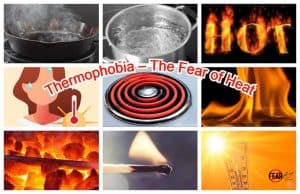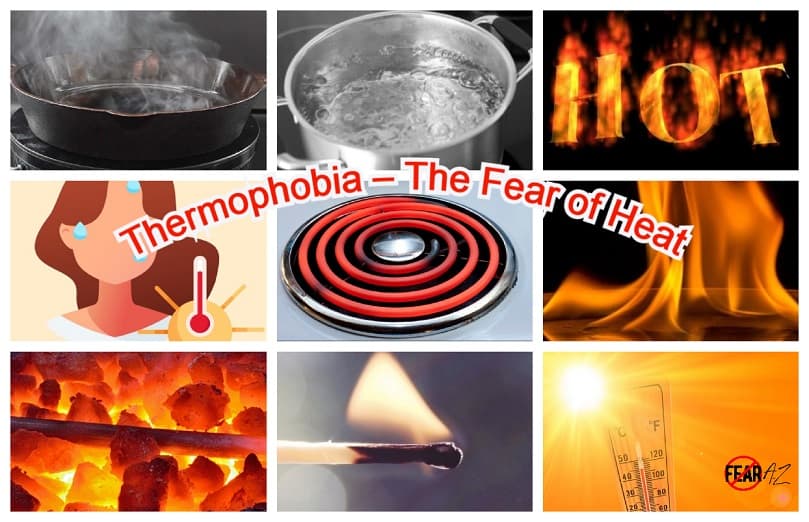Share This Article
Thermophobia Is the Excessive Fear of Heat
Everyone perspires in the heat, but did you know that some people break out into a cold sweat instead?
These people have a severe and persistent fear of high temperatures.
Do you take extreme measures to avoid hot foods or objects? Are you terrified by the idea of scorching weather?
Do you panic at the thought of encountering fires or other sources of heat? You may be suffering from thermophobia.
Don’t worry. A little patience and effort go a long way in beating thermophobia. Read on to learn everything about this heat phobia, its causes, symptoms, treatments, and more.

What Is Thermophobia?
Thermophobia is the intense fear of heat. Thermophobia is derived from the Greek terms therme, meaning “heat,” and phobos, meaning “fear.” This phobia is associated with:
- Fear of the sun or sunlight (heliophobia)
- Fear of sweating (bromidrophobia)
- Fear of fire (pyrophobia)
- Fear of hot weather (aestophobia)
A person suffering from this phobia may feel extreme anxiety at the mere thought of heat. This abnormal fear is towards anything related to heat, including summer weather or hot things. It’s normal to avoid touching fire and other hot objects. After all, no one wants to get burned or scalded. High heat is not particularly pleasant, so we tend to avoid it. The key difference? This fear is persistent and irrational. You don’t just dislike the heat; you are in terror of it.
What Are Thermophobia Triggers?
Anything can trigger thermophobia: getting burned, getting parched, sweating, or the inability to tolerate heat. One may go into flight or fight mode when confronted with heat. The body goes through an unpleasant or terrifying experience and is unable to fight the fear. A person suffering from thermophobia may avoid getting near things that emit heat like fires, grills, furnaces, and stoves.
How Do Phobia Sufferers Behave?
Those with thermophobia take extreme measures to avoid heat. They may even move to colder climates or stay indoors in air-conditioned rooms all day. Some with thermophobia limit their diet to cool or cold food. And even though the person suffering may realize the fear is irrational, there’s not much they can do. They may start adopting safety behaviors like completely avoiding going out during the daytime.
What Causes Thermophobia?
Thermophobia is caused due to the same reasons as other specific phobias. Phobia of heat can be a result of past experiences or childhood trauma. Some experts claim that phobias may also have a genetic factor. Other thermophobia causes include:
Childhood Trauma
Childhood experiences play a major role in developing phobias. It may not develop at the time of the event, but it may manifest gradually. In childhood, the person may have gone through a bad experience, like heat stroke, dehydration, or burn injuries. Each time they come across heat, the negative emotions may come rushing back triggering thermophobia. It can also be a traumatic experience like the death of a loved one due to a fire. This means that heat becomes associated with grief.
Genetics
A family history of anxiety disorders increases the chances of a person developing a phobia. If one has a genetic predisposition to mental illness, one event might be enough to trigger the phobia.
Associated Fears
Other phobias contribute to the development of thermophobia, such as the fear of death, sweating, sun, getting burned, and fire. These fears can result in a person suffering from thermophobia.
Upbringing
People who are raised by phobics are likely to develop a similar condition. Being brought up by someone who transmits a sense of danger related to heat will increase the chances of having thermophobia.
Symptoms of Thermophobia
Some thermophobia symptoms sound innocent. For example, you may prefer wearing lightweight clothing and staying indoors on warm days. But for most sufferers, thermophobia is characterized by severe and chronic anxiety. Here’s an extensive list of physical, mental, and emotional symptoms of thermophobia:
Physical Symptoms
- Muscle tension/tremors
- Heightened senses
- Increased heart pulse
- Dizziness
- Nausea
- Migraine
- Dry mouth
- Butterflies in the stomach
- Hot/cold flashes
- Difficulty breathing
- Sweating
- Trembling
- Tightening in chest
- Ringing in your years
- Feeling confused
- A rise in blood pressure
- Hyperventilation
Mental/Emotional Symptoms
- Anxiety when encountering heat
- Anxiety at thoughts of heat
- Panic attack
- Avoiding heat at all costs
- Fear of fainting
- Withdrawal
- Feeling sad
- Difficulty concentrating
- Anger or mood swings
- Guilt
- Fear of dread
- Feeling trapped
- Expecting disaster
If you have three to five of these symptoms, and your anxiety has lasted for six or more months, you may have thermophobia. Consult a medical professional to obtain an accurate diagnosis.
Ways to Treat Thermophobia
There are various steps you can take to overcome the fear of heat. If your fear is mild, you could begin with self-help methods. You can also seek professional help.
Self-Help Guide to Treating Thermophobia
Treating thermophobia, like with any other specific phobia, needs patience, effort, and consistency. No one treatment suits all. It depends on the individual and the severity of the condition. To overcome thermophobia on your own, you can initiate stress management techniques, like meditation, yoga, and cardio. Being able to know how to help yourself and cope with your fear is important. Take good care of yourself and practice any of the following to overcome your fear of heat.
Meditate
Meditation guides one to distract and refocus on something more productive like breathing. Mastering meditation aids in maintaining a sense of equilibrium when confronted with stressful situations.
Practice Yoga
A person who has mastered yoga will know how to redirect their energy into coping rather than being anxious when experiencing a panic attack.
Limit Caffeine
You might very well save yourself from everyday anxiety by cutting down on coffee. Foods and drinks with caffeine affect your physical state. Caffeine increases your heart rate and tenses you up, increasing your chances of anxiety.
Do Cardio
Cardio workouts like swimming, jogging, and sports release feel-good hormones in your body that ease up your stress related to phobia.
Seeking Professional Help
Thermophobia treatment through professional help can assist you in understanding your situation, so you can better cope with it. Some techniques used to overcome thermophobia include:
- Cognitive behavioral therapy
- Counseling
- Exposure therapy
- Dialectical behavior therapy
- Mindfulness-based stress reduction
Psychotherapy or counseling gives you a safe space to express how you feel without fearing that you will be judged. This talk therapy aims to help you recognize your fear and resolve complicated feelings. Why does this work? Talking to a highly trained professional helps you make sense of things and understand yourself better. Exposure therapy aims to desensitize you slowly to the objects of fear. It happens gradually until you don’t feel an intense amount of anxiety when confronted with such situations.
How to Cope with Thermophobia
Does thermophobia have a firm hold on you? Sufferers may take extreme measures to avoid situations that bring them near heat or anything remotely related to heat. Avoidance helps them escape anxiety and stress and it feels pleasant at the time. But repetitive use of avoidance behaviors can turn into compulsions and worsen the phobia instead of actually treating it. This can also affect your everyday life, relationships, and career. Learning to cope becomes important as a phobia can render you incapable of leading a normal life.
Wrapping Up
Living in fear of heat can be debilitating. Thermophobia can affect a person’s personal, social, and professional life. But proper treatment and support can ease the anxiety, if not completely rid you of it. Acknowledging the phobia is your first step towards recovery. Although treatment takes patience and consistency, living without the constant fear of heat will be worth the effort. Soon, you’ll look forward to basking in the balmy heat.




